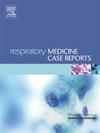Pathologic complete response to pralsetinib in stage IV RET-positive non-small cell lung cancer: A case report
IF 0.8
Q4 RESPIRATORY SYSTEM
引用次数: 0
Abstract
Neoadjuvant therapy with tyrosine kinase inhibitors has been proposed as a feasible approach for downstaging potential resectable non-small cell lung cancer (NSCLC). Pralsetinib is a paradigm of precision medicine for cancers driven by mutant RET (rearranged during transfection). In this case, we reported dramatic response to Pralsetinib in a stage IV NSCLC patient with RET rearrangement. Strikingly, treatment with 10 months of Pralsetinib impended downstaging of the N2 lymph node and metastatic pleural disease. Histological examination of the surgically resected specimen indicated a pathologic complete response (pCR). The patient was recommended to continue Pralsetinib as an adjuvant therapy. This case highlighted potential application of Pralsetinib in locally advanced RET-positive NSCLC to prime surgical resection. Postoperative Pralsetinib adjuvant therapy should also be considered.
4期ret阳性非小细胞肺癌患者对普拉塞替尼的病理完全缓解1例报告
酪氨酸激酶抑制剂的新辅助治疗被认为是降低潜在可切除的非小细胞肺癌(NSCLC)分期的可行方法。普拉塞替尼是由突变RET(在转染期间重排)驱动的癌症的精确医学范例。在这个病例中,我们报道了一例RET重排的IV期NSCLC患者对普拉塞替尼的显著反应。引人注目的是,10个月的普拉塞替尼治疗可以降低N2淋巴结和转移性胸膜疾病的分期。手术切除标本的组织学检查显示病理完全缓解(pCR)。建议患者继续使用普拉塞替尼作为辅助治疗。该病例强调了普拉塞替尼在局部晚期ret阳性NSCLC中的潜在应用。术后还应考虑普拉塞替尼辅助治疗。
本文章由计算机程序翻译,如有差异,请以英文原文为准。
求助全文
约1分钟内获得全文
求助全文
来源期刊

Respiratory Medicine Case Reports
RESPIRATORY SYSTEM-
CiteScore
2.10
自引率
0.00%
发文量
213
审稿时长
87 days
 求助内容:
求助内容: 应助结果提醒方式:
应助结果提醒方式:


